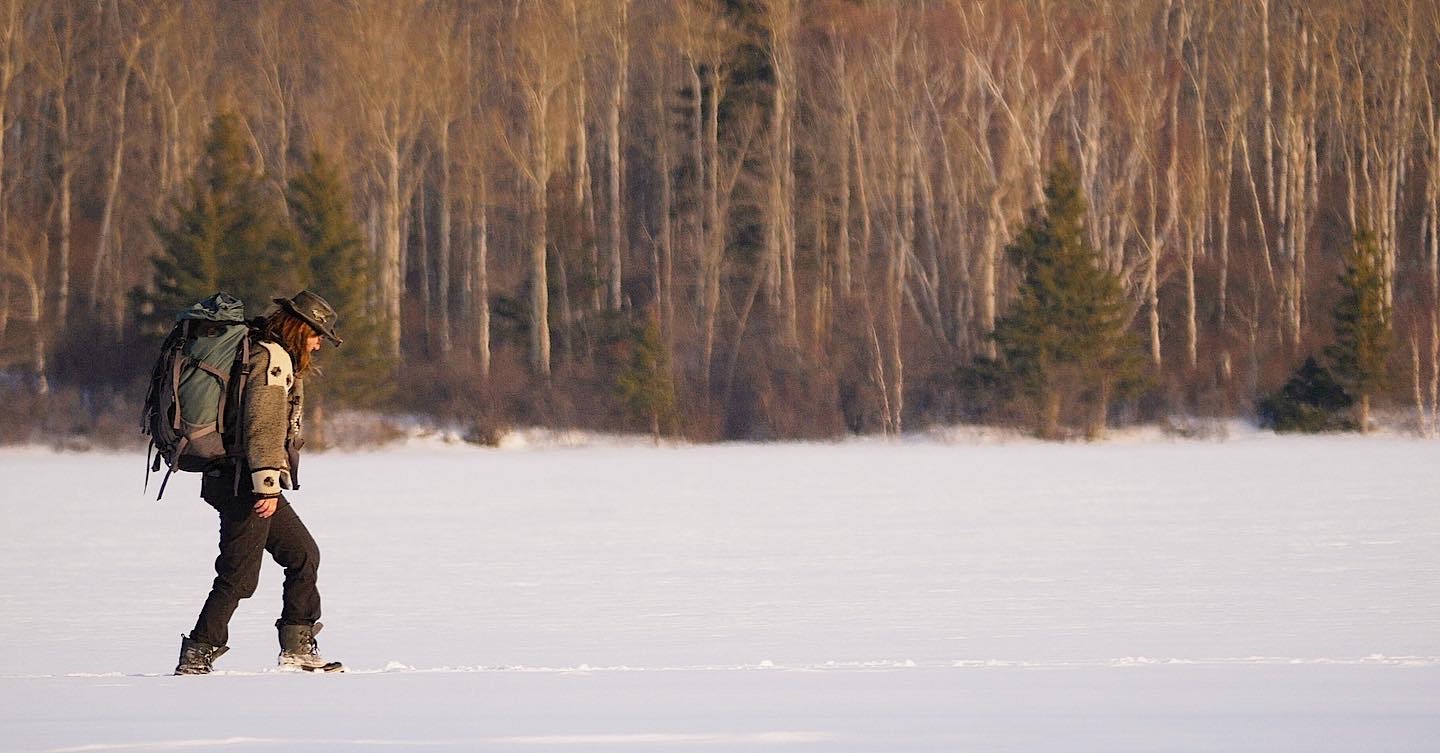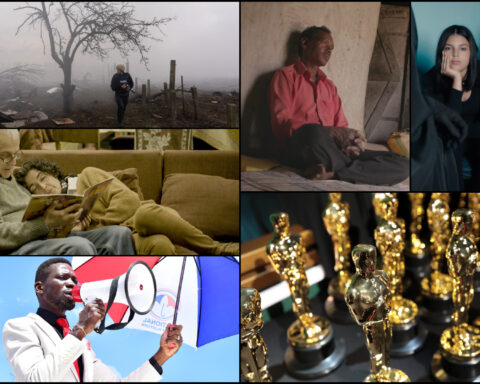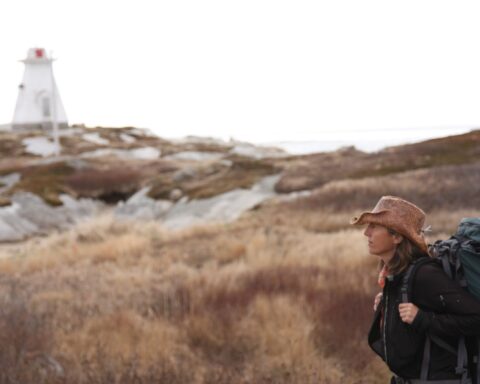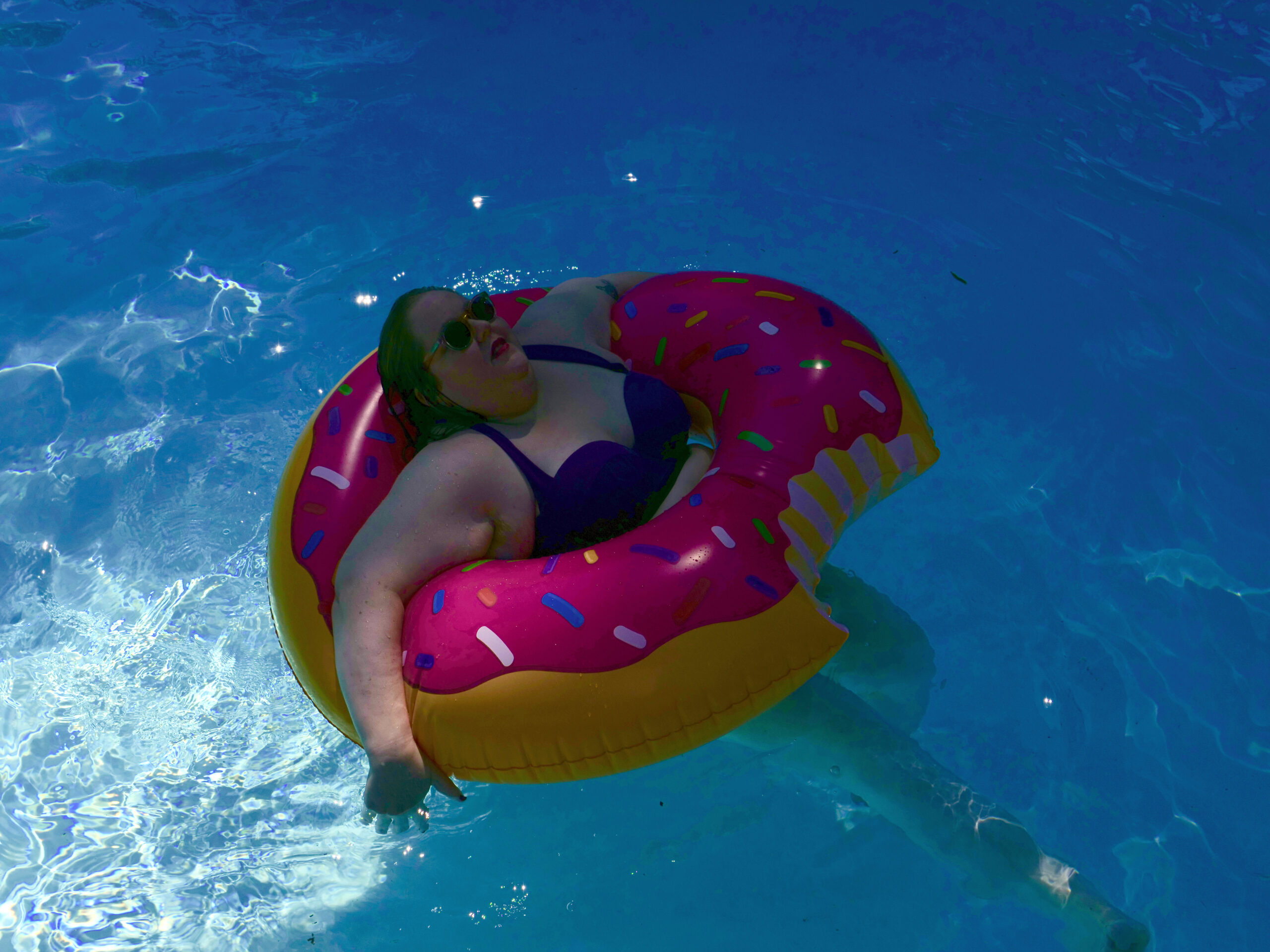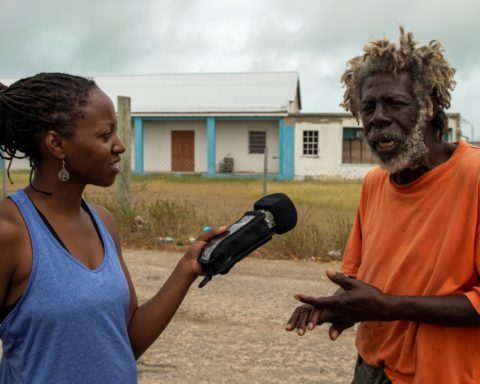The northern lights will have to take a backseat as bulbs on the marquee of the Yukon Theatre light up the sky with the return of the Available Light Film Festival. The Whitehorse festival kicks off tonight with a screening of the supernatural Maritime-shot drama The King Tide. ALFF boasts a strong documentary contingent once again with highlights from around the circuit joining the line-up alongside some Oscar nominees and local films. ALFF’s industry side also boasts a doc spotlight with filmmakers Asher Penn (Physician, Heal Thyself), Kat Jayme (I’m Just Here for the Riot), and Jules Koostachin (WaaPaKe) in a conversation moderated by NFB producer Teri Snelgrove, along with a case study on the CBC series Black Life: Untold Stories featuring co-executive producer Sandy Hudson in conversation with activist Paige Galette.
For movies, though, ALFF still has online options for audiences who are missing out on the fun up north. Virtual ALFF begins midway through the festival, running Feb. 14 to 28. Docs streaming virtually include the acclaimed Aitamaako’Tamisskapi Natosi: Before the Sun and My Place Ozerna. In person, audiences in Whitehorse can check out the irreverent mockumentary Hey, Viktor!, the acclaimed Someone Lives Here, and (although it’s a drama), my favourite film of 2023, The Taste of Things, which couldn’t be a bitter offering for Valentine’s day. But this is POV, so let’s focus on the docs!
Here are 10 documentary highlights at this year’s Available Light Film Festival:
Silvicola
Friday, Feb. 9 at 1:00 pm (and online beginning Feb. 14)
Silvicola offers a visually rich exploration of the forest industry told through the hands that work among the trees. Director Jean-Philippe Marquis considers the state of the industry and its environmental consequences through the perspectives of people who need forestry to earn a living. The film captures the beauty of the landscape, but also the devastation as workers examine the stumps of old growth trees or plant seedlings among a graveyard of trees razed and abandoned on the woodland floor without reason.
“When I was sharing meals with loggers, I would sense this internal dilemma. Often, those forestry jobs were the only ones that were available in these small, remote areas,” Marquis told Madeline Lines in POV #118. “They loved the forest, but they needed to feed their families too. The film is about this vulnerability.”
A Boy Called Piano: The Story of Fa’amoana John Luafutu
Saturday, Feb. 10 at 12:00 pm (and online beginning Feb. 14)
Making its Canadian premiere at the festival, this New Zealand production profiles Samoan-born Luafutu, who, like many young Pacific Islanders and Samoan children, was forcibly taken from his family and put into state services. The film uses his story to share the many untold histories of abuse that children endured when the state put them under its care. A Boy Called Piano lets Luafutu reclaim his story in his own voice and his own words.
WaaPaKe (Tomorrow)
Saturday, Feb. 10 at 3:00 pm (and online beginning Feb. 14)
The traumas and resilience of residential school survivors fuel this personal NFB documentary by Dr. Jules Arita Koostachin. WaaPaKe (Tomorrow) sees Koostachin explore intergenerational trauma and ask how pain is passed down from one generation to the next. The director begins with her experience as the child of a residential school survivor, incorporating the voice of her mother, Rita, into the film and draws upon the lessons of oral storytelling she learned from her Cree grandparents. “There’s great vulnerability here as Koostachin and her family, including her son Asivak, share how they’ve collectively felt Rita’s heartache. With pain comes healing, though,” I wrote while reviewing WaaPaKe at VIFF, where it won Best BC Film. “One participant, a counsellor named Maisie whose siblings and father shared Rita’s experience, explains that the route to breaking the cycle of lateral violence comes by confronting intergenerational trauma, by speaking up. The experience might be pure hell for all involved, but the process of making WaaPaKe proves palpably cathartic.”
500 Days in the Wild
Sunday, Feb. 11 at 3:00 pm; Thursday, Feb. 15 at 3:00 pm
On Canada Day, 2015, Dianne Whelan left St. John’s, Newfoundland to embark on an epic trek across Canada. Travelling the Trans-Canada Trail and the many waters that connect communities from coast to coast, Whelan made an historic trek and captured it on camera. 2224 days and 24,000 km later, Whelan landed in Victoria, B.C. having traversed all corners of the Canadian landscape. The film, which won the audience award at the Whistler Film Festival, sees Whelan brave the elements and find harmony with the landscape. It’s a daunting challenge, but Whelan embraces her inner Cheryl Strayed and keeps putting one foot forward after the other, conquering all fears with some help from loved ones along the way. Whelan also connects with Indigenous communities throughout the journey home. She draws upon traditional knowledge and practices to learn more about the history that informs her path. (Stay tuned for an interview with Whelan later this month!)
A Bullet Pulling Thread
Monday, Feb. 12 at 4:00 pm
Quilter Marilyn Farquhar weaves through her grief one stitch at a time in A Bullet Pulling Thread. The film directed by Ian Daffern tells how Farquhar’s brother, Barry, was killed by police when officers ill-equipped to respond to cases involving mental illness used force, rather than empathy, to control the situation. Farquhar channels her pain and her hunger for justice into a series of quilts, which she tours across Canada with hopes to raise awareness for adequate first responders and a correction to the system’s approach to mental health. “By combining the stories of these two siblings and the many lives that Marilyn touches along the way, A Bullet Pulling Thread captures the need to correct the ways in which public bodies, namely law enforcement, deal with issues related to mental health. The film adds to the conversation that docs like No Visible Trauma, Insanity, Attila, and Someone Lives Here further to challenge Canada’s institutional malaise,” I wrote in POV’s review for the film. “Moreover, the palpable portrait of grief and loss, conveyed so sincerely and intimately through Marilyn’s quilts and people’s responses to them, puts a deeply moving emphasis on the injustice created by outdated approaches to mental health.”
Physician, Heal Thyself
Monday, Feb. 12 at 6:30 pm
Dr. Gabor Maté is a resident talking head of Canadian documentary. He’s weighed in about addiction, trauma, stress, and childhood development in documentaries such as Dosed: The Trip of a Lifetime, Drunk on Too Much Life, Hurt, and many other works in which characters meet with the physician, or Maté offers expert advice as an interviewee. Now, Maté is the subject of his own documentary with the appropriately titled Physician, Heal Thyself. Director Asher Penn chronicles Maté’s personal journey that shaped his worldview and signature compassionate approach to therapy, highlighting the practices that make him such an influential thinker. “One doesn’t necessarily need to be a follower of the church of Dr. Gabor Maté to recognize the moral of his story. His story preaches openness and empathy as key therapeutic ingredients,” I wrote in POV’s review for the film. “Penn generally leaves the account to the star’s point of view, although elements of the naysayers’ perspectives are evident in archival clips that punctuate the film. Physician, Heal Thyself isn’t looking to defend or debunk Maté’s practices. Rather, this is a probing look at the origin story of an influential mind.”
20 Days in Mariupol
Tuesday, Feb. 13 at 6:00 pm
and
Four Daughters
Tuesday, Feb. 13 at 8:30 pm
Do a double bill of Oscar nominees with these docs from Ukraine and Tunisia. 20 Days in Mariupol offers a bravura feat from the front lines as journalist and filmmaker Mstyslav Chernov captures the early days of Russia’s invasion of Ukraine. The war is twofold as Chernov and other journalists find themselves racing to get the story told amid a rush of fake news that recontextualize images and frame them with outright lies. The film gives the bigger picture while serving as an essential document of history in the making. Meanwhile, a search to reconcile truth and lies comes in Four Daughters, Kaouther Ben Hania’s innovative work that fuses non-fiction storytelling with elements of performance. Six women—two daughters, two actresses playing daughters, a mother, and an actress who steps in when the story becomes too painful to share—reflect upon a family rupture. The film deftly uses these different modes of storytelling to confront a painful revelation about why two of Olfa’s titular daughters cannot be present to share their sides of the story. Read more about the films in our interviews with Chernov and Ben Hania.
Eagle Plains
Wednesday, Feb. 14 at 8:15 pm
Visit one of the northernmost rests stops in Canada, if not the world with a trip to Eagle Plains. Leah Byrne’s documentary about the small Yukon town with a population of eight people makes its world premiere at ALFF. Eagle Plains offers an observational portrait of the lone stop to gas up along the 740-kilometer stretch of the Dempster Highway en route to the Arctic Circle. With nary a word, the film gives an episodic glimpse at the machinery that keeps Eagle Plains running. We see the rest stop’s jack-of-all-trades sourcing the water that runs throughout the self-contained community, manning the machinery (with a cigarette dangling from his mouth at all times), and processing the few travellers who make the necessary pit stop. It might seem like a barren lonely place, but Byrne captures the landscape lovingly with an eye that could inspire audiences to gas up and brave the Eagle Plains diner.
Tautuktavuk (What We See)
Thursday, Feb. 15 at 8:30 pm
Fans of Four Daughters might want to chat another genre-bender with this Inuit autofiction drama. Filmmakers/actors Carol Kunnuk and Lucy Tulugarjuk star as sisters Saqpinak and Uyarak who stay connected despite being miles apart. The former is at home up north, while the latter is stuck in Montreal when the COVID-19 pandemic hits and lockdowns kick in. The sisters talk frequently through Zoom and their stories reflect life in the social distancing era. Their conversations gradually lead them to confront buried traumas when complications compounded by the hardship of isolated living reopen old wounds. “The narrative set-up eventually dissolves into the documentary aesthetic. These are real stories and true experiences that simply need a film to find catharsis,” I wrote while reviewing the film during TIFF. “When the ‘sisters’ eventually reconnect, emotions run high as the film tackles violence of colonialism, but also the increase in domestic violence that occurred when COVID-19 forced couples inside for prolonged times.”
Feet in Water, Head on Fire
Saturday, Feb. 17 at 8:30 pm
Anyone looking for a fresh voice on the Canadian scene will find it in Terra Long’s Feet in Water, Head on Fire. The film might strike audiences in the way that Jacquelyn Mills’ experimental Geographies of Solitude wowed the crowds on the circuit. Long displays an equally strong eye and aesthetic sensibility in this essay film that considers the people and land of the Coachella valley, and the histories entailed within.
“I wanted to hand process and didn’t want to bring chemicals into a region that is so deeply tied to the landscape,” Long told Marc Glassman in the Spring issue of POV. “I wanted to leave as little a trace as possible. So, I decided I’d do eco-processing there. Dates are really high in phenolic acids [a type of chemical used in film development]. My first big foray into hand-processing was during harvest time in a date oasis. The results were so beautiful and effective.”
Y’a une étoile
Sunday, Feb. 18 at 3:00 pm (and online from Feb. 14)
Audiences looking to have an upbeat experience on the doc front will find it in this music film from Julien Cadieux. Y’a une étoile offers a unique portrait of Samuel LeBlanc, a transgender musician who opens up about the complexities of growing up as a queer person in Acadia. Combining interviews, dance sequences, and an eye for spreading joy and awareness with equal measure, the film invites audiences to understand the experiences that shape person’s creative outlet, but also to recognize the diversity of gender identities and ways of expressing—and celebrating—them. “What is fascinating about the conversations that LeBlanc has over the course of the documentary is the common thread of having to navigate two identities,” said Courtney Small in POV’s review for the film. “While coming to terms with their true self was a challenge, one Two-Spirited interviewee recalls denying their Indigenous heritage for a long time while they also wrestled with what it means to be Acadian. The sense of isolation and close-mindedness that comes with being different in a rural community is often one of the catalysts that lead queer individuals to leave their hometowns.”




